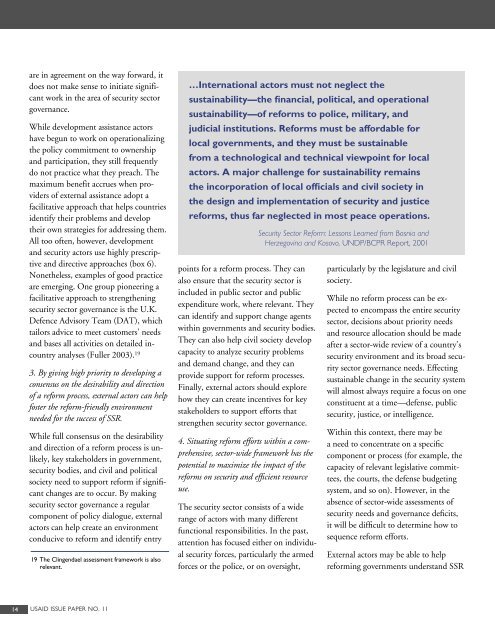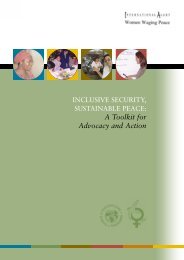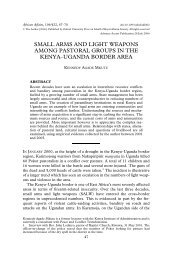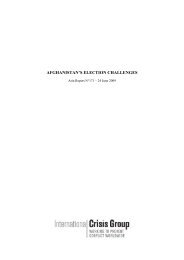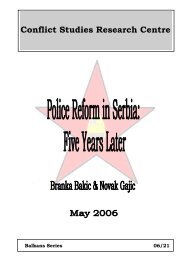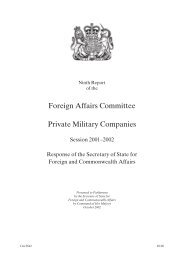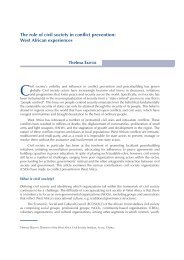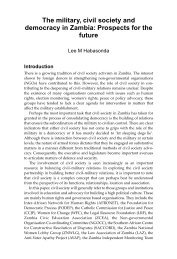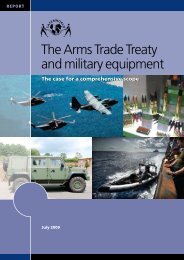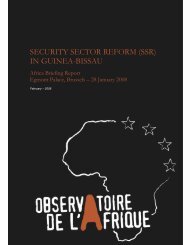promoting security sector reform in fragile states - GFN-SSR
promoting security sector reform in fragile states - GFN-SSR
promoting security sector reform in fragile states - GFN-SSR
Create successful ePaper yourself
Turn your PDF publications into a flip-book with our unique Google optimized e-Paper software.
are <strong>in</strong> agreement on the way forward, it<br />
does not make sense to <strong>in</strong>itiate significant<br />
work <strong>in</strong> the area of <strong>security</strong> <strong>sector</strong><br />
governance.<br />
While development assistance actors<br />
have begun to work on operationaliz<strong>in</strong>g<br />
the policy commitment to ownership<br />
and participation, they still frequently<br />
do not practice what they preach. The<br />
maximum benefit accrues when providers<br />
of external assistance adopt a<br />
facilitative approach that helps countries<br />
identify their problems and develop<br />
their own strategies for address<strong>in</strong>g them.<br />
All too often, however, development<br />
and <strong>security</strong> actors use highly prescriptive<br />
and directive approaches (box 6).<br />
Nonetheless, examples of good practice<br />
are emerg<strong>in</strong>g. One group pioneer<strong>in</strong>g a<br />
facilitative approach to strengthen<strong>in</strong>g<br />
<strong>security</strong> <strong>sector</strong> governance is the U.K.<br />
Defence Advisory Team (DAT), which<br />
tailors advice to meet customers’ needs<br />
and bases all activities on detailed <strong>in</strong>country<br />
analyses (Fuller 2003). 19<br />
3. By giv<strong>in</strong>g high priority to develop<strong>in</strong>g a<br />
consensus on the desirability and direction<br />
of a <strong>reform</strong> process, external actors can help<br />
foster the <strong>reform</strong>-friendly environment<br />
needed for the success of <strong>SSR</strong>.<br />
While full consensus on the desirability<br />
and direction of a <strong>reform</strong> process is unlikely,<br />
key stakeholders <strong>in</strong> government,<br />
<strong>security</strong> bodies, and civil and political<br />
society need to support <strong>reform</strong> if significant<br />
changes are to occur. By mak<strong>in</strong>g<br />
<strong>security</strong> <strong>sector</strong> governance a regular<br />
component of policy dialogue, external<br />
actors can help create an environment<br />
conducive to <strong>reform</strong> and identify entry<br />
19 The Cl<strong>in</strong>gendael assessment framework is also<br />
relevant.<br />
…International actors must not neglect the<br />
susta<strong>in</strong>ability—the f<strong>in</strong>ancial, political, and operational<br />
susta<strong>in</strong>ability—of <strong>reform</strong>s to police, military, and<br />
judicial <strong>in</strong>stitutions. Reforms must be affordable for<br />
local governments, and they must be susta<strong>in</strong>able<br />
from a technological and technical viewpo<strong>in</strong>t for local<br />
actors. A major challenge for susta<strong>in</strong>ability rema<strong>in</strong>s<br />
the <strong>in</strong>corporation of local officials and civil society <strong>in</strong><br />
the design and implementation of <strong>security</strong> and justice<br />
<strong>reform</strong>s, thus far neglected <strong>in</strong> most peace operations.<br />
po<strong>in</strong>ts for a <strong>reform</strong> process. They can<br />
also ensure that the <strong>security</strong> <strong>sector</strong> is<br />
<strong>in</strong>cluded <strong>in</strong> public <strong>sector</strong> and public<br />
expenditure work, where relevant. They<br />
can identify and support change agents<br />
with<strong>in</strong> governments and <strong>security</strong> bodies.<br />
They can also help civil society develop<br />
capacity to analyze <strong>security</strong> problems<br />
and demand change, and they can<br />
provide support for <strong>reform</strong> processes.<br />
F<strong>in</strong>ally, external actors should explore<br />
how they can create <strong>in</strong>centives for key<br />
stakeholders to support efforts that<br />
strengthen <strong>security</strong> <strong>sector</strong> governance.<br />
4. Situat<strong>in</strong>g <strong>reform</strong> efforts with<strong>in</strong> a comprehensive,<br />
<strong>sector</strong>-wide framework has the<br />
potential to maximize the impact of the<br />
<strong>reform</strong>s on <strong>security</strong> and efficient resource<br />
use.<br />
The <strong>security</strong> <strong>sector</strong> consists of a wide<br />
range of actors with many different<br />
functional responsibilities. In the past,<br />
attention has focused either on <strong>in</strong>dividual<br />
<strong>security</strong> forces, particularly the armed<br />
forces or the police, or on oversight,<br />
Security Sector Reform: Lessons Learned from Bosnia and<br />
Herzegov<strong>in</strong>a and Kosovo, UNDP/BCPR Report, 2001<br />
particularly by the legislature and civil<br />
society.<br />
While no <strong>reform</strong> process can be expected<br />
to encompass the entire <strong>security</strong><br />
<strong>sector</strong>, decisions about priority needs<br />
and resource allocation should be made<br />
after a <strong>sector</strong>-wide review of a country’s<br />
<strong>security</strong> environment and its broad <strong>security</strong><br />
<strong>sector</strong> governance needs. Effect<strong>in</strong>g<br />
susta<strong>in</strong>able change <strong>in</strong> the <strong>security</strong> system<br />
will almost always require a focus on one<br />
constituent at a time—defense, public<br />
<strong>security</strong>, justice, or <strong>in</strong>telligence.<br />
With<strong>in</strong> this context, there may be<br />
a need to concentrate on a specific<br />
component or process (for example, the<br />
capacity of relevant legislative committees,<br />
the courts, the defense budget<strong>in</strong>g<br />
system, and so on). However, <strong>in</strong> the<br />
absence of <strong>sector</strong>-wide assessments of<br />
<strong>security</strong> needs and governance deficits,<br />
it will be difficult to determ<strong>in</strong>e how to<br />
sequence <strong>reform</strong> efforts.<br />
External actors may be able to help<br />
<strong>reform</strong><strong>in</strong>g governments understand <strong>SSR</strong><br />
14 USAID ISSUE PAPER NO. 11


